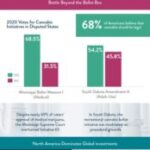Legal Cannabis Strongly Positioned for Another Milestone Year in 2022

The Year in Review: Market Expansion & Pressure Points Against Progress
December 17, 2021
California Tax Rates Impede Legal Operators
January 18, 2022By John Kagia, Chief Knowledge Officer, New Frontier Data
The cannabis industry enters the new year facing a complex set of global dynamics to set foundations for another milestone year in the emerging global cannabis economy.
In New Frontier Data’s upcoming report, 22 for 2022: Cannabis Industry Assertions & Predictions, we explore 22 key issues shaping the market in the year ahead, offer predictions on how they will play out, and analyze what impacts they are likely to have on the market.
In the U.S. — which is projected to account for 86% of global legal cannabis sales in 2022 — we analyze the respective impacts that launching three major East Coast adult-use markets (i.e., New York, New Jersey, and Virginia) will have across the legal cannabis landscape and on the national conversation in America.
Those three states should generate nearly $11 billion in sales by 2025, accounting for nearly one-quarter of all legal U.S. sales. New York and Virginia will be especially influential, with New York City (as a cultural mecca and the nation’s most-visited tourist destination) playing an unprecedented role in exposing American and international travelers to legally regulated cannabis. Likewise, with the U.S. Capitol sitting adjacent to Virginia (and its congressional lawmakers and staff living within an immediate commute), regulated adult-use cannabis in the Old Dominion will provide new access and acceptance of legal cannabis businesses, making real and tangible an industry which for many had previously remained an oft-misunderstood abstraction.
The potential influence of legal cannabis on congressional lawmakers is particularly noteworthy given the lack of progress toward federal reforms in 2021. Deep partisan divisions within Congress regarding how the federal government should regulate cannabis were compounded by an increasingly acrimonious political climate despite generally broadening agreement that the status quo is untenable.
The Democrats’ Cannabis Administration & Opportunity Act and the Republicans’ States Reform Act shared some core principals including descheduling cannabis (versus legalizing it), granting states with autonomy for regulating their respective markets (or keeping cannabis illegal), creating a federal excise tax, investing in research about related health effects of cannabis, and expunging nonviolent cannabis offender records. However, with significant differences remaining toward fundamental issues including excise tax rates, oversight agencies, which cannabis offenders should be eligible for release and records expungement, and how large a federal role will play in stimulating the new industry though grants and development programs, the prospects for the parties’ reaching consensus before the November midterm elections appear dim.
Meanwhile, such slow movement toward a coherent national policy will continue to constrict entry of major non-cannabis companies to the industry, though New Frontier Data expects 2022 to see one or two major CPG companies join the growing ranks of alcohol, tobacco, and pharma companies making substantive investments into the space, especially Canada’s fully regulated market.
Last year saw a dramatic rebound for the industry’s capital raises, after the COVID-19 pandemic’s disruptions drove a steep decline in capital inflows in 2020. With continued strong growth expected going into 2022, the industry is poised for record capital inflows. Nevertheless, New Frontier Data is closely monitoring the broader economic climate, tracking economic headwinds which have gathered strength over the last few months. While cannabis consumer demand has largely proven to be recession-proof in retaining stability (and in some cases, increasing demand) during economic contractions, an economic downturn would constrict the capital markets, slowing investment into each business expansion, M&A, and innovation.
A slowdown in investment activity would be especially challenging for high-growth, capital-intensive businesses which may be generating revenue but still require significant capital infusions to fund their operations and growth.
The end of 2021 saw dramatic developments in Europe, as Luxembourg, Germany, and Malta, respectively, announced intentions to legalize adult-use cannabis. While the final forms of each market remain to be seen, the global impact of Germany’s announcement, in particular, will reverberate well into the new year. As Europe’s largest and most influential economy, Germany’s legal market increase pressure on other major European powers to liberalize their cannabis policies. Furthermore, the German announcement is already attracting interest from many American companies which previously ignored the European market as they raced to build scale in large, existing domestic markets.
With Germany now in play, New Frontier Data expects several U.S. companies to announce partnerships, investments, and M&A with European players to establish footholds across the country’s estimated $14.5 billion cannabis market opportunity.
Other themes explored in 22 for 2022: Cannabis Industry Assertions & Predictions the impact of increased wholesale taxes in California’s market growth, the evolution of the consumer product landscape and its influence on consumer preferences and behavior, challenges in regulating issues (e.g., product testing and impaired driving), the impact of the FDA’s delay in releasing regulations governing CBD on the U.S. hemp market (including on the acreage under cultivation expected for 2022), and outlooks for delta-8 THC and other minor cannabinoids amid tightening state regulations. New Frontier Data is also monitoring the expansion of legalization into more conservative U.S. states where, despite strong public support, conservative lawmakers are working to stop or slow the establishment of the industry.
With another year of explosive growth forecast for legal state markets, green shoots among emerging adult-use markets in Europe (and medical markets worldwide), and the increasing global normalization and acceptance of cannabis, look to have the market well positioned for another year of record growth, even absent U.S. federal reforms. Still, the broader, pandemic-disrupted economic climate could prove to remain the wild card which slows the industry’s expansion by constricting investments for building capacity, expanding markets, and fueling innovation for the industry’s near-term growth.




